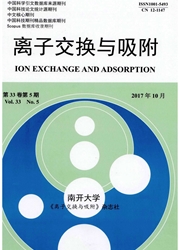

 中文摘要:
中文摘要:
对工业级甲基丙烯酸十二酯单体进行了精制提纯,采用悬浮聚合法合成了甲基丙烯酸十二酯树脂。利用傅立叶变换红外光谱(FTIR)对精制前后单体以及树脂的结构进行了表征、利用热分析仪(TG)和差式扫描量热仪(DSC)对树脂的热性能进行了分析,同时研究了精制时碱液浓度对树脂饱和吸油率、吸油速率以及充分溶胀后树脂剩余率的影响。结果表明,精制后单体合成的树脂耐热性能有了明显改善,热降解温度大大提高;精制前后单体合成的树脂,由于杂质存在的缘故,其低温玻璃化转变类型明显不同;经6wt%碱液和8wt%碱液精制后单体的纯度有了明显提高,由其合成的树脂饱和吸油率,吸油速率都有较大提高,甚至接近化学纯单体合成树脂的饱和吸油率。
 英文摘要:
英文摘要:
Industrial lauryl methacrylate was refined, and homopolymer resin made up of lauryl methacrylate was synthesized by suspension polymerization. Fourier-transform infrared (FTIR) spectroscopy was used to characterize the structural variation of refined monomer and the resin. Thermogravimetric analysis (TG) and Differential scanning calorimetry (DSC) were used to research thermal properties of resin. At the same time, the effects of concentration of alkali lye during refining on the saturated oil absorbency, oil absorption rate, the content ratio of the remaining resin after sufficient swelhng experiment were studied. The results showed that the heat-resistance of resin synthesized by refined monomer was improved and thermal decomposition temperature increased. Due to the impurity, resin synthesized by industrial monomer was compared with resin synthesized by refined monomer, the types of low temperature glass transition differed with each other distinctly. Purity of monomer refined by 6wt% and 8wt% alkali lye was improved obviously and saturated oil absorbency, along with oil absorptive rate of the resin synthesized by those monomer was increased, even was close to saturated oil absorbency of resin synthesized by chemical purity monomer imported from Belgium.
 同期刊论文项目
同期刊论文项目
 同项目期刊论文
同项目期刊论文
 Swelling and crystallization behaviors of absorptive functional fiber based on butyl methacrylate/hy
Swelling and crystallization behaviors of absorptive functional fiber based on butyl methacrylate/hy A novel absorptive functional fiber copolymerized by butyl methacrylate with hydroxyethyl methacryla
A novel absorptive functional fiber copolymerized by butyl methacrylate with hydroxyethyl methacryla Study on absorptive property and structure of resin copolymerized by butyl methacrylate with hydroxy
Study on absorptive property and structure of resin copolymerized by butyl methacrylate with hydroxy 期刊信息
期刊信息
